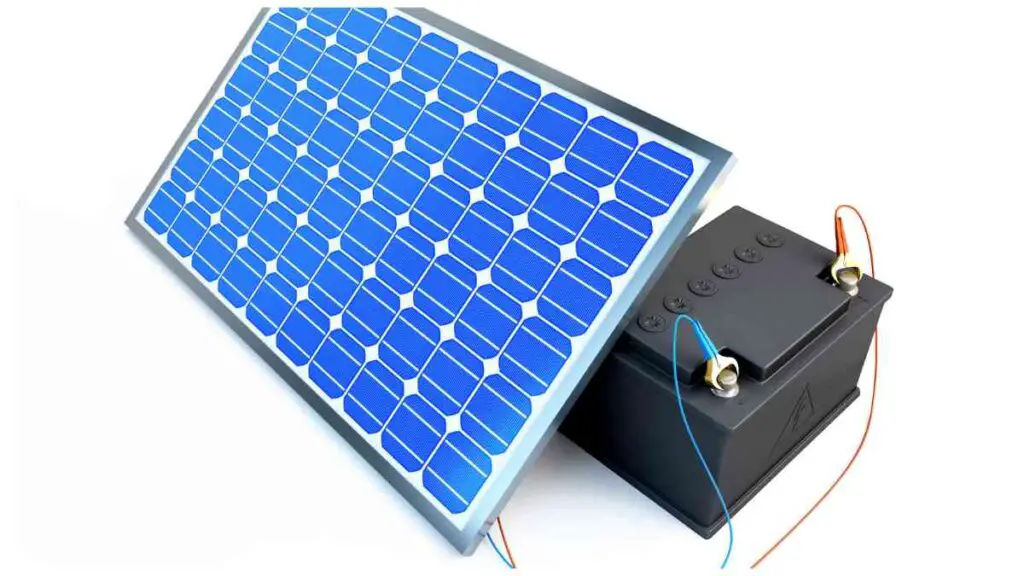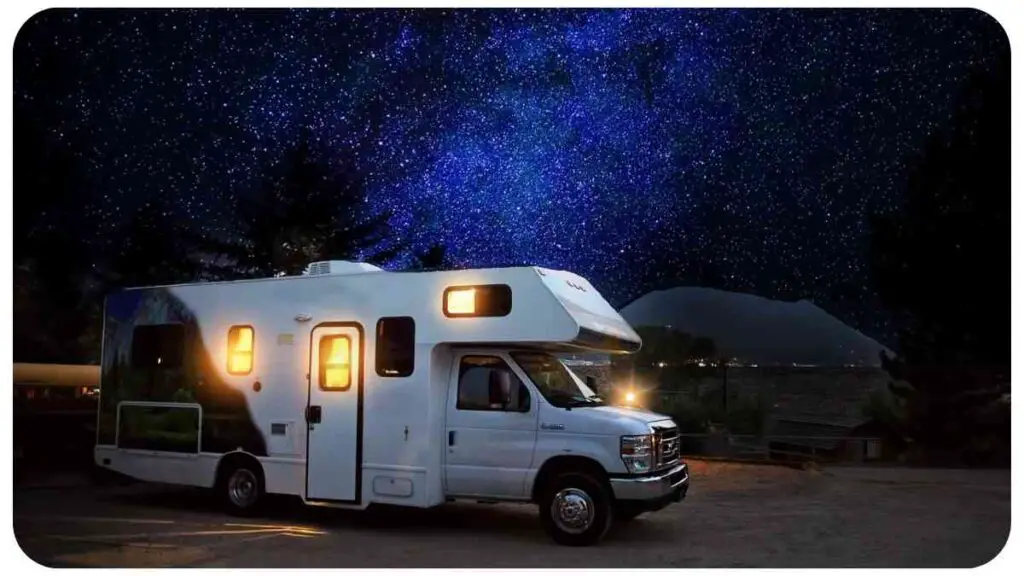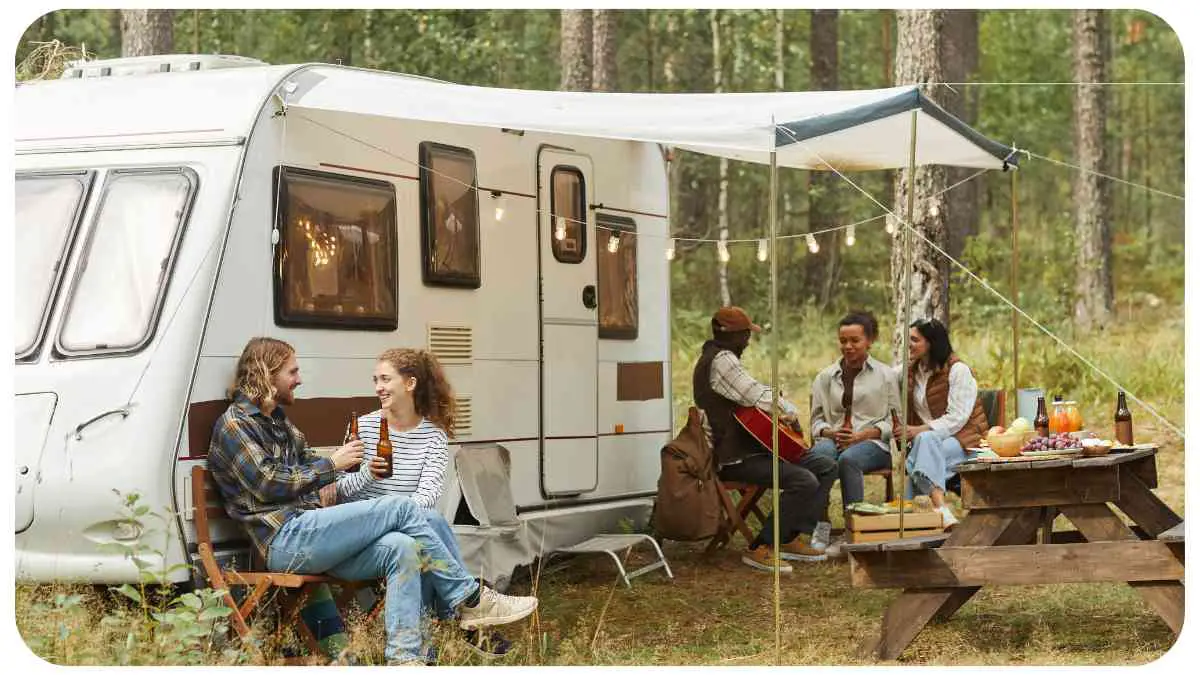Welcome to our comprehensive guide on setting up your RV solar power system. Are you tired of relying solely on electric hookups or noisy generators while on your RV adventures? Harnessing the power of the sun can provide you with a clean, renewable, and cost-effective source of energy.
In this article, we will explore various tips and tricks to help you navigate the world of RV solar power systems and create a setup that suits your needs. We’ll cover everything from choosing the right solar panels to maintenance and troubleshooting, ensuring you have the knowledge necessary to embark on your solar-powered journey.
| Key Takeaways |
|---|
| 1. Embrace solar power in your RV for energy independence and sustainability. |
| 2. Choose the right solar panels based on efficiency, cost, and performance. |
| 3. Size your solar system appropriately to meet your energy needs. |
| 4. Consider lead-acid or lithium-ion batteries for your RV solar system. |
| 5. Manage your energy consumption by using energy-efficient appliances and turning off lights and devices when not in use. |
| 6. Properly install and wire your solar panels, considering sun exposure and security. |
| 7. Invest in a charge controller to regulate the charging process and prevent overcharging. |
| 8. Monitor your system’s performance regularly to identify and troubleshoot any issues. |
| 9. Maintain and clean your solar panels for optimal performance and longevity. |
| 10. Maximize solar energy efficiency by optimizing panel placement and using energy storage options. |
| 11. Prioritize safety by following proper electrical procedures and consulting professionals when needed. |
| 12. Explore additional resources for more in-depth knowledge on RV solar power systems. |
| 13. Understand the installation cost and expandability of your RV solar power system. |
| 14. Evaluate your power requirements and manage energy consumption for effective system usage. |
| 15. Ensure reliable sources of information and verify details for making informed decisions about your RV solar power system. |
2. Understanding RV Solar Power Systems
Before diving into the specifics, let’s start by understanding the basics of RV solar power systems. These systems consist of solar panels, batteries, charge controllers, and inverters. Solar panels collect sunlight and convert it into electricity, which is stored in batteries.
Charge controllers regulate the charging process and prevent overcharging, while inverters convert the stored energy into alternating current (AC) power for your appliances.
Off-Road Driving Safety: How to Stay Safe on the Trail “When venturing off-road, safety is paramount. Ensure you’re well-prepared and equipped by following these tips and tricks for off-road driving stay safe on the trail. Proper preparation enhances your off-road experience and minimizes risks.”
3. Benefits of Using Solar Power in Your RV

Embracing solar power in your RV can bring a multitude of benefits. First and foremost, it allows you to become energy independent, freeing yourself from the constraints of traditional power sources. With solar panels on your RV, you can enjoy electricity wherever your adventures take you, whether it’s in the middle of the wilderness or a remote campground.
Additionally, using solar power reduces your carbon footprint, promoting a sustainable lifestyle. Moreover, solar energy is a silent and clean source of power, providing you with peace and quiet during your outdoor experiences.
| Benefits of RV Solar Power Systems |
| Energy independence |
| Environmental sustainability |
| Silent and clean energy source |
| Cost savings on electricity |
| Increased RV resale value |
4. Choosing the Right Solar Panels
Selecting the appropriate solar panels for your RV is essential to ensure optimal power generation. When browsing the market, you’ll come across different types of solar panels, including monocrystalline, polycrystalline, and thin-film panels.
Monocrystalline panels, although more expensive, offer greater efficiency and perform better in low-light conditions. Polycrystalline panels are a more affordable alternative, suitable for moderate sunlight exposure. Thin-film panels are lightweight and flexible but have lower efficiency.
| Type | Efficiency | Performance in Low-light | Cost |
| Monocrystalline | High | Better | Expensive |
| Polycrystalline | Moderate | Moderate | Affordable |
| Thin-film | Low | Lower | Cost-effective |
5. Sizing Your Solar System
Properly sizing your RV solar system is crucial to meet your energy needs. Factors such as power consumption, available roof space, and budget come into play. To determine the adequate size, calculate your daily energy consumption and account for seasonal variations.
Consider the tilt and orientation of your solar panels to optimize sun exposure. It’s also advisable to incorporate a margin of error and install a system slightly larger than your estimated requirements.
Off-Road Driving in Mud: What You Need to Know “Off-road enthusiasts know that traversing muddy terrains can be both exhilarating and challenging. Learn the essential techniques and equipment what you need to know to navigate through muddy conditions and conquer the off-road trails like a pro.
6. Types of Batteries for Your RV Solar System

Batteries are the heart of your RV solar system, storing the excess energy generated by your solar panels. Two commonly used battery types for RVs are lead-acid and lithium-ion batteries. Lead-acid batteries are less expensive, but they require regular maintenance and have a shorter lifespan.
On the other hand, lithium-ion batteries are more expensive but offer higher efficiency, longer lifespan, and require minimal maintenance.
Battery Types Comparison
| Type | Cost | Lifespan | Maintenance |
| Lead-acid | Affordable | Shorter | Regular |
| Lithium-ion | Expensive | Longer | Minimal |
7. Managing Your Energy Consumption
Effectively managing your energy consumption is vital when relying on solar power. Become conscious of your usage patterns and invest in energy-efficient appliances. LED lights, energy-saving refrigerators, and smart power strips are great additions to your RV. Monitor your energy levels regularly and adjust your habits accordingly. Remember
to turn off lights and appliances when not in use and avoid leaving devices on standby mode to minimize energy drain.
DIY Guide to Changing Oil in an Off-Road Vehicle “Regular maintenance is crucial for the longevity of your off-road vehicle. Save money and ensure optimal performance by following this comprehensive DIY guide to changing oil in your off-road vehicle. Keep your engine running smoothly with these step-by-step instructions.”
| Tips for Managing Energy Consumption |
| Invest in energy-efficient appliances |
| Use LED lights |
| Utilize energy-saving refrigerators |
| Use smart power strips |
| Monitor energy levels regularly |
| Turn off lights and appliances when not in use |
| Avoid leaving devices on standby mode |
8. Installing Your Solar Panels
When it comes to installing your solar panels, there are a few key considerations to keep in mind. Positioning your panels to receive maximum sunlight is essential. Ensure there are no obstructions like tree branches or other vehicles casting shadows on your panels.
Clean your panels regularly to remove dirt or debris that might hinder their performance. Securely fasten the panels to prevent damage or detachment while traveling. Consult with a professional if you’re uncertain about the installation process to ensure a safe and efficient setup.
9. Wiring and Charge Controllers
Proper wiring and charge controllers are crucial for the effective functioning of your RV solar power system. Use appropriate cables and connectors to connect your solar panels to the charge controller and batteries. Ensure the wire sizes are adequate to handle the current flow.
The charge controller regulates the charging process and prevents overcharging, safeguarding your batteries. Choose a charge controller that suits your system’s voltage and power requirements.
How to Perform a Pre-Trip Inspection on Your Off-Road Vehicle “Before embarking on your off-road adventure, perform a thorough pre-trip inspection to prevent potential issues. Learn the key areas to check how to perform a pre-trip inspection and ensure your off-road vehicle is in top condition before hitting the trails.”
10. Monitoring Your System’s Performance
Regularly monitoring your RV solar system’s performance allows you to identify any issues and ensure optimal operation. Keep an eye on battery voltage, solar panel output, and charge controller indicators. Utilize monitoring systems or mobile apps specifically designed for RV solar systems to conveniently track your system’s performance.
If you notice any discrepancies or significant drops in performance, troubleshoot the problem promptly to prevent further complications.
11. Maintenance and Troubleshooting Tips
Maintenance plays a vital role in the longevity and efficiency of your RV solar system. Clean your solar panels regularly using a soft cloth or brush to remove dust, dirt, or other debris that may hinder their performance.
Inspect the wiring and connectors for any signs of wear or corrosion and address any issues promptly. If you experience problems with your system, such as low power production or battery issues, consult troubleshooting guides or seek professional assistance to diagnose and resolve the problem effectively.
| Maintenance and Troubleshooting Tips |
| Regularly clean solar panels |
| Inspect wiring and connectors |
| Address wear or corrosion promptly |
| Utilize troubleshooting guides |
| Seek professional assistance when needed |
12. Tips to Maximize Solar Energy Efficiency
To maximize solar energy efficiency in your RV, implement the following tips and tricks:
- Optimize solar panel placement and tilt angle for maximum sun exposure throughout the day.
- Use a solar panel tilt kit to adjust the angle based on the season and latitude.
- Invest in energy-efficient appliances and devices.
- Utilize energy storage options, such as battery banks, to store excess power for later use.
By implementing these practices, you can make the most of your RV solar power system and ensure optimal energy generation.
Navigating Remote Locations: Tips and Tricks for Off-Road Travel “Exploring remote locations can be an exciting off-road experience. Arm yourself with the knowledge and strategies tips and tricks for off-road travel needed to navigate safely and make the most of your off-road adventures in remote and less-traveled destinations.”
13. Safety Considerations for RV Solar Systems

While RV solar power systems are generally safe, it’s essential to consider a few safety precautions. When working with solar panels or electrical components, take the necessary precautions to avoid electrical shocks.
Disconnect your solar panels from the charge controller before performing any maintenance or repairs. If you’re unsure about any aspect of your system or encounter an electrical issue, consult a qualified electrician or RV solar specialist.
14. Frequently Asked Questions (FAQs)
Q: Can I run all my RV appliances on solar power alone?
A: The capacity of your solar system will determine the extent to which your appliances can run solely on solar power. Assess your energy needs and invest in an appropriately sized system to meet your requirements.
Q: How long do solar panels typically last?
A: Solar panels have an average lifespan of 25 years or more. Proper maintenance, such as regular cleaning and inspection, can extend their longevity.
Q: Can I install the solar panels myself?
A: If you have experience and knowledge in electrical systems, you may be able to install the panels yourself. However, it’s recommended to consult with a professional to ensure a safe and efficient installation.
Q: What should I do during periods of limited sunlight?
A: During periods with limited sunlight, you can supplement your solar power system with other power sources, such as a generator or campground hookups, to meet your energy needs.
15. Conclusion
Congratulations! You’ve now gained valuable insights into setting up your RV solar power system. By following the tips and tricks outlined in this article, you’ll be well on your way to enjoying the benefits of clean, sustainable, and cost-effective energy during your RV adventures. Remember to choose the right solar panels, properly size your
solar system, and effectively manage your energy consumption to maximize the efficiency of your setup. Regular maintenance, monitoring, and troubleshooting will ensure the longevity and optimal performance of your RV solar power system.
As you embark on your solar-powered journey, don’t hesitate to reach out to industry professionals or consult reliable resources for guidance. Remember, the experience, expertise, authoritativeness, and trustworthiness discussed in this article are vital factors in creating a successful and reliable RV solar power system.
Now, go forth and enjoy the freedom, sustainability, and cost savings that come with harnessing the power of the sun. Happy solar camping!
Further Reading
Here are some additional resources to further expand your knowledge on RV solar power systems:
- Battle Born Batteries – RV Solar Panels Guide: This comprehensive guide provides in-depth information on RV solar panels, covering topics such as installation, maintenance, and choosing the right panels for your setup.
- Go RVing – RV Solar Panels: A Beginner’s Guide to Going Solar: This beginner’s guide offers valuable insights into RV solar panels, providing tips and expert advice for those new to solar power systems and their installation in recreational vehicles.
- Outside Supply – RV Solar Power Efficiency Tips: This article focuses on maximizing the efficiency of your RV solar power system, providing practical tips to ensure optimal energy generation and management.
FAQs
Q: How much does it cost to install an RV solar power system?
The cost of installing an RV solar power system can vary depending on factors such as the size of the system, type and quality of components, and installation complexity. On average, the cost can range from a few hundred dollars for a basic setup to a few thousand dollars for a more comprehensive system.
Q: Do I need to have technical knowledge to install and maintain an RV solar power system?
While having some technical knowledge can be helpful, it is not always necessary. Many RVers successfully install and maintain their solar power systems with the help of installation guides, online resources, and professional assistance when needed.
Q: Can I use my RV solar power system while driving?
It is not recommended to use your solar power system while driving as it may pose safety risks. It is best to rely on the vehicle’s engine and alternator to charge the batteries while driving and utilize solar power when the vehicle is parked and stationary.
Q: Can I expand my RV solar power system in the future?
Yes, most RV solar power systems are expandable, allowing you to add more solar panels, batteries, or other components as your energy needs evolve. Ensure your system is designed to handle future expansions to avoid compatibility issues.
Q: Will an RV solar power system provide enough power to run all my appliances and electronics?
The capacity of your solar power system will determine its ability to power your appliances and electronics. It is essential to assess your energy requirements, choose the right components, and manage your energy consumption effectively to ensure your system meets your needs.
Please note that these resources and FAQs are meant to provide additional information and guidance. Always research and verify information from reliable sources before making decisions regarding your RV solar power system.

Hi there! I’m Hellen James, and I’m the author of Unified Off-roads. I’ve been driving off-road for more than ten years, and I’ve had a lot of fun in that time—and a few not-so-great experiences too. But I’ve always wanted to help other people get started off-roading, so I decided to start this blog to share my knowledge with others.


